ta [tá] vb. 1. to say, to state: Ọ tae
vbene o ya de ― “He stated how it
happened” ta-ma ― “to tell, to
report to”^, (cf. khaa). talọ plural or
reiterative sense of ta: to talk con-
tinuously; to narrate; to prattle; to
chat.; 2. (with isẹ) to play the isẹ
game Isẹ Ẹdo lọghọ gbe ne a ta ―
“Isẹ Edo is very difficult to play”;
3. (with ile) to make a bet.
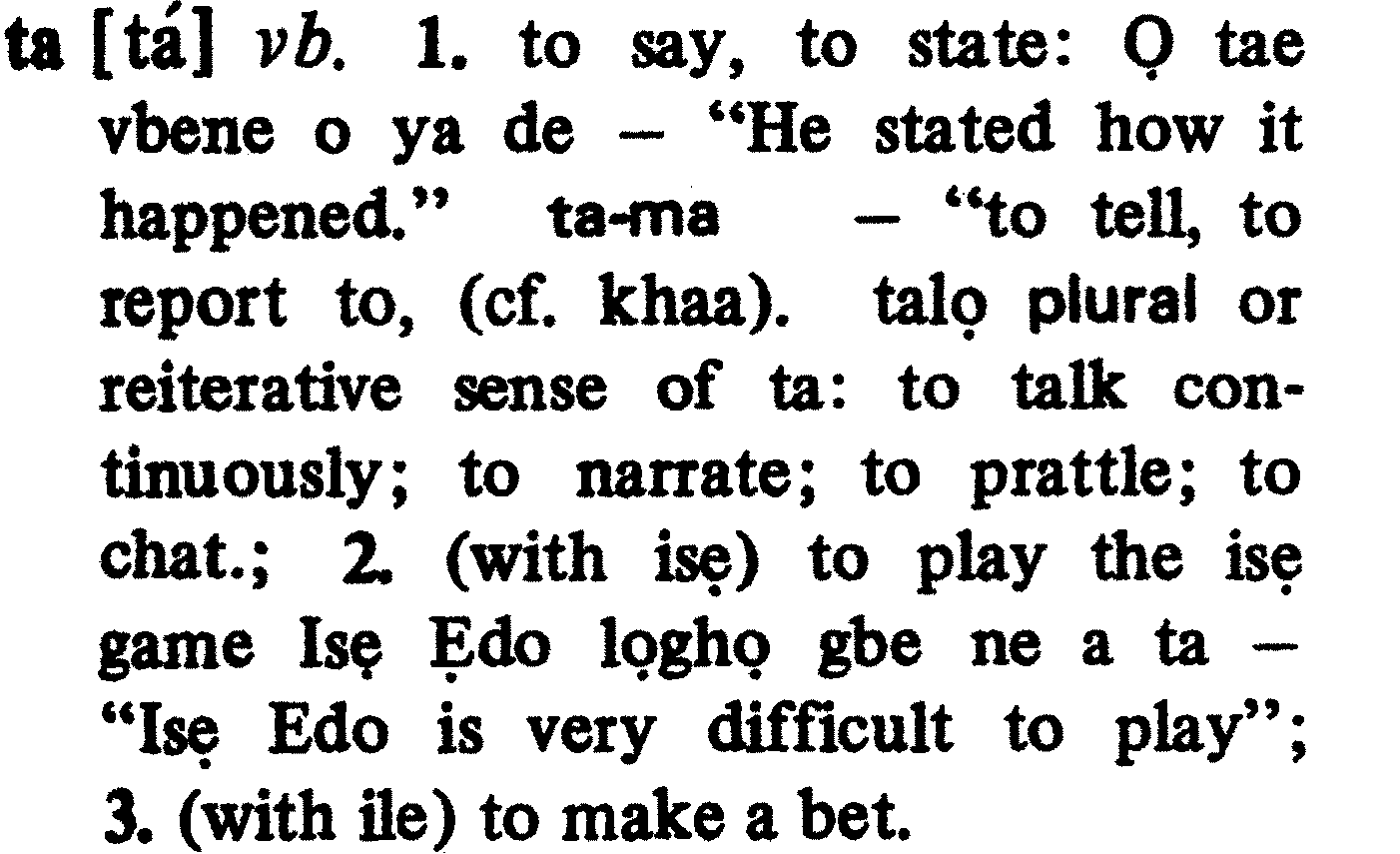
taa [tàá] vb. 1. to imitate; to mimick:
Ọ guẹ vbe a taa ọmwan ― “He is
good at imitating people.”; 2. to
compare: Ai ya Edo taa igue ― “You
cannot compare Benin with a village.”

tafia [tàfyá] vb. to be nosy; to meddle;
to interfere; to be forward. Ẹi re iren
a tiere; te ọ tafia lele iran ― “It was
not him they called, he merely for-
wardly tagged along with them.”

taintain [tã̀ĩtã̀ĩ] adv. 1. describes the
taste of being over-salted: Uwọnmwẹn
na fian taintain ― “This soup tastes
heavily over-salted.”; 2. describes the
pungent whiff of urine: Úkpo na
fian taintain ne ahiọ ― “This bed
stinks of urine.”
%%
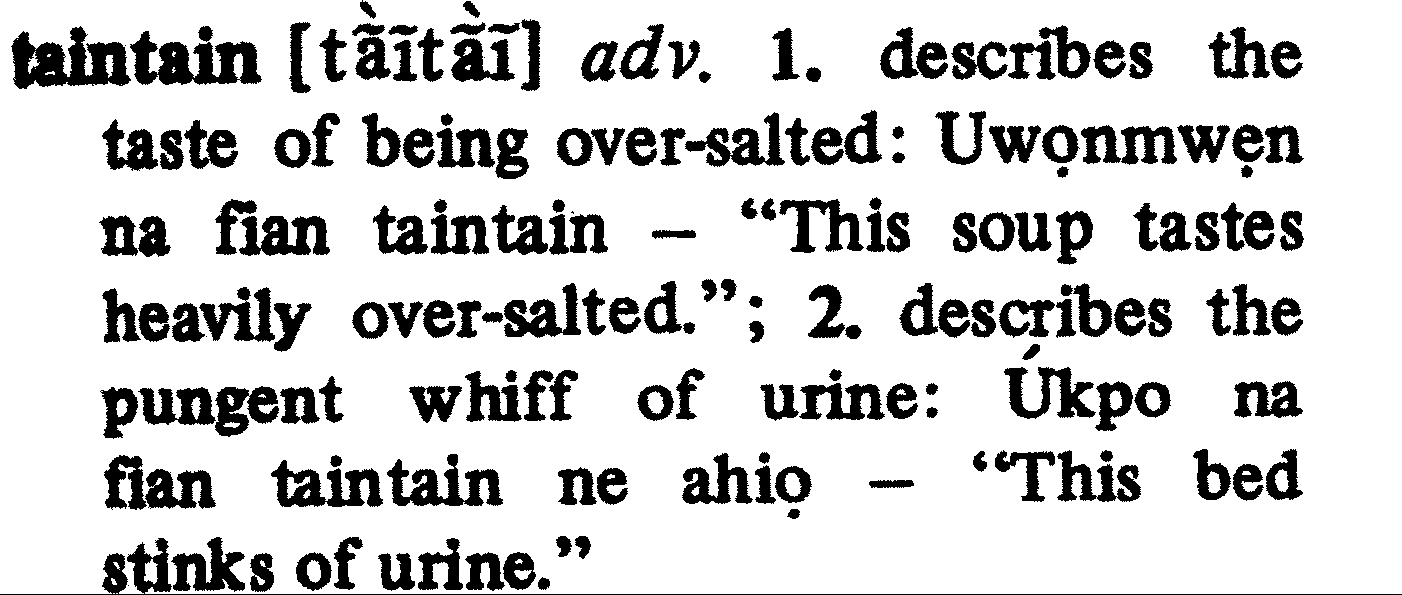
takhirhi [táxìřì] vb. to perform a single
or multiple somersaults in the air.

talọ [tàlɔ́] vb. 1. pl. or reit. sense of
ta1: Iran gha talọ ― “They are talk-
ing.”; 2. To grumble; to complain:
Ọ gha talọ ighẹ i ma doo tuẹ iran ―
“He is complaining that I did not
come to visit them.”: talọ kue ― “to
upbraid; to insult”: Iran hia talọ kue
ọre rhunmwunda emwin daan ne ọ
ru ― “They all upbraided him for
the bad things that he did”. talọ maa
― “to report to; to lay a complaint
with.” Iran doo talọ ẹmwẹn ọnrẹn
maa erhae ― “They came to report
him to his father.”; 3. (idiom) to
be mentally deranged or unstable: Ọ
talọ ― “He is mentally unstable.”
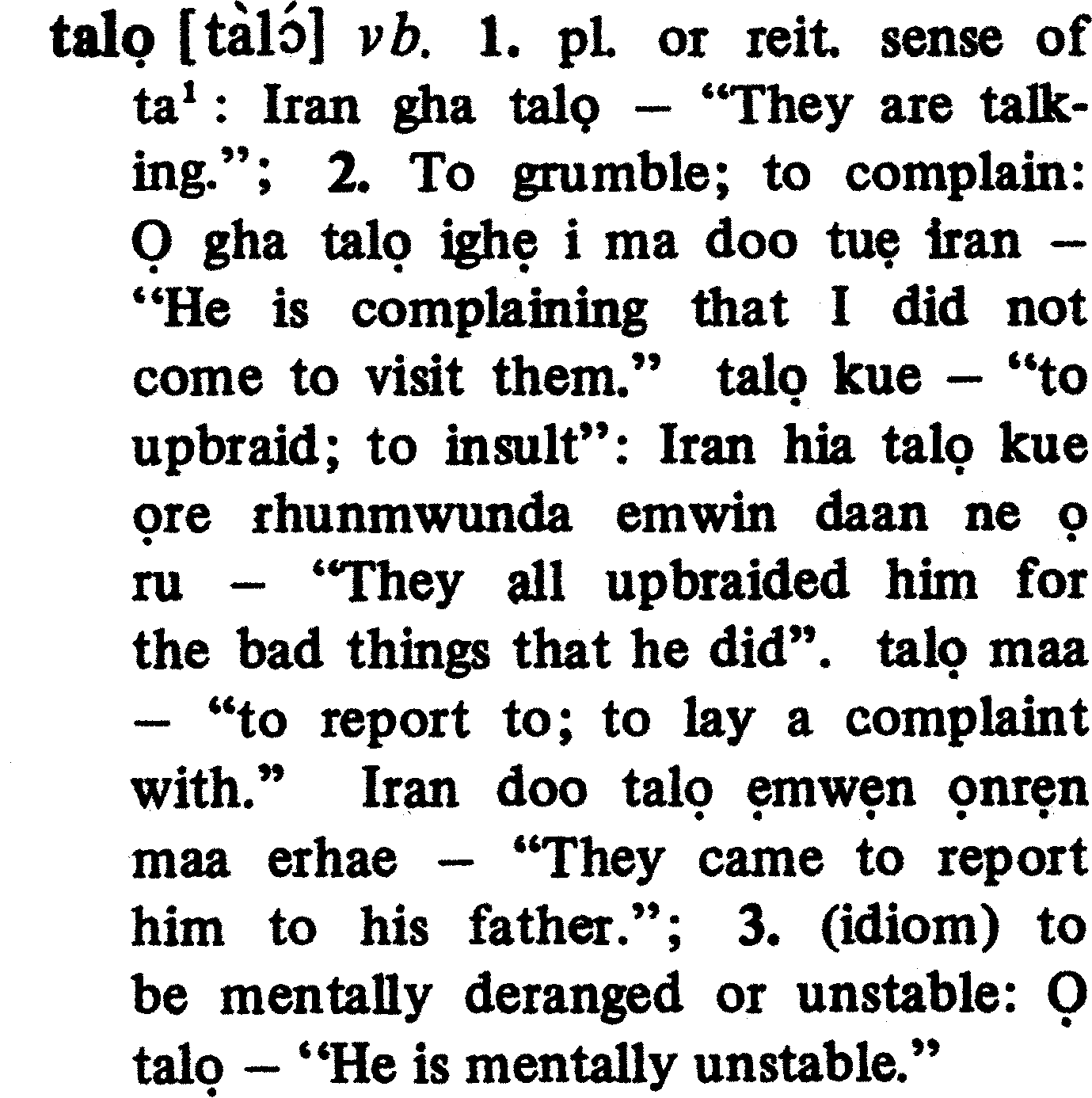
tamaa [tàmã̀ã́] vb. to tell (also
khamaa).

tan1 [tã́] vb. 1. to be tall (of human
beings): Ọvbokhan na gha tan ―
“This child will be tall.”; 2. to be
long (applies to both time and
objects): Ẹghẹ ne ọ gbe vbe Ẹdo ẹre
ọ tan sẹẹ ne ọ khian gbe vbe Eko ―
“The period he spent in Benin is
$Page 142$
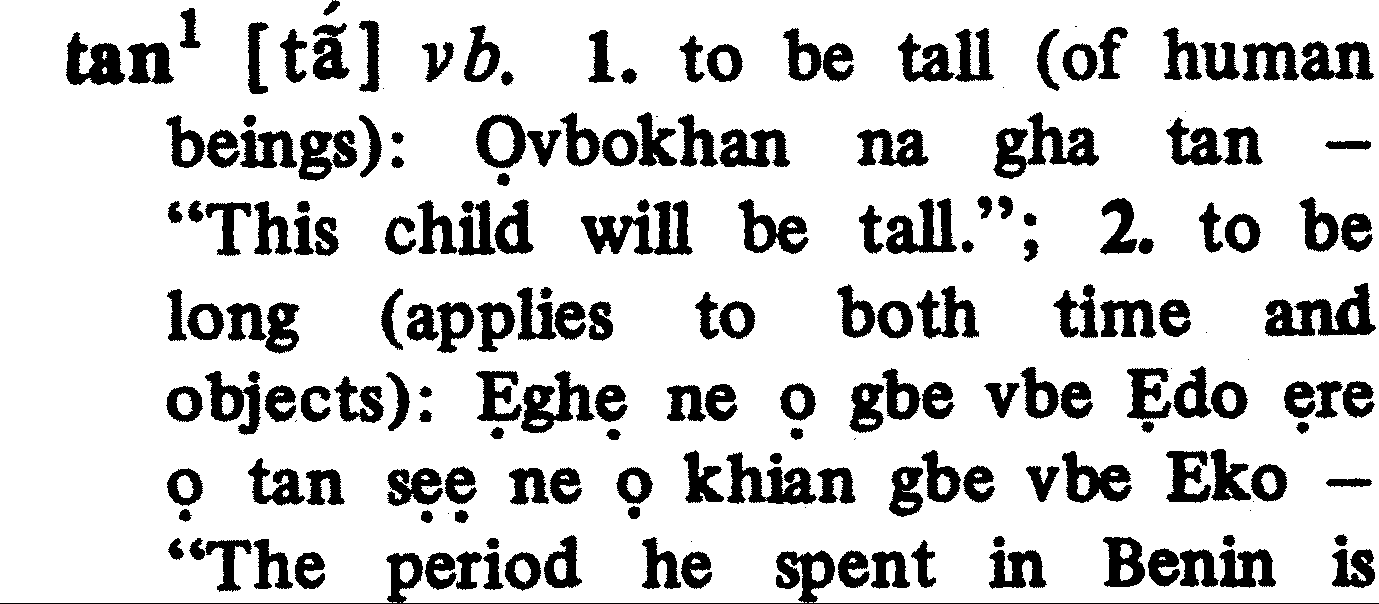
longer than what he will spend in
Lagos.” Erhan na ma tan sẹ vbene
ima ho ― “This stick is not long
enough as we want”: “^This stick
is not as long as we would want.”

tan2 [tã́] vb. 1. to spread out: Iran
tan ukpọn ye ovẹn ― “They spread
out clothes in the sun.”; 2. to hang
or tie across (e.g. a rope): Ọ tan
irri ye odẹ ― “He tied a rope across
the road.”
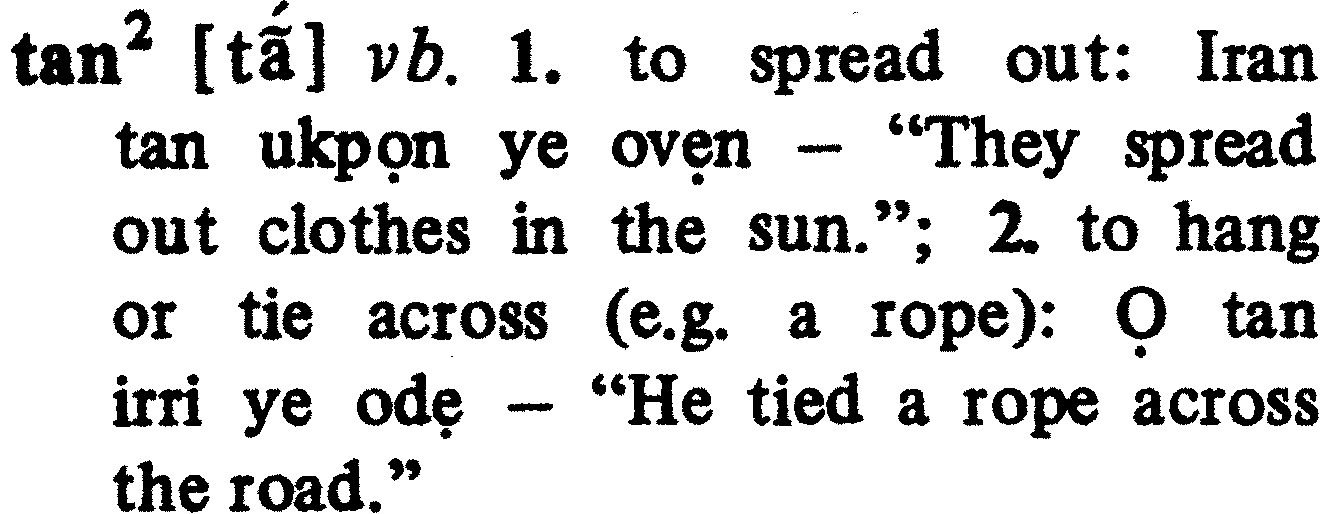
tantanantan [tã̀tã̀ã̀tã̀] adv.; adj. de-
scribes something that is erect; straight
and stiff: Ọ niẹ egbe rua tantanantan ―
“He stretched his body out straight
and erect.”

te1 [té] aux 1. almost: Ọ te de ― “He
almost fell.”; 2. before: Ozo te kpaọ,
ọ keghi tuẹ iran ― “Before Ozo left,
he greeted them.”

te2 [té] aux. 1. (with psychic st. vbs,
such as hoo ― “like”, “want”; roo ―
“think”; etc.): implies that the state
expressed in the verb was not attained:
Ọ te hoo ne i wu ― “He had wanted
me to die.”; 2. (with over vbs.): implies
that the state or action described in
the vb., though attained or ac-
complished, is still lacking in truth-
value or effect, in some respect, and
so the clause is usually followed by
another clause introduced by sokpan
(but): Ọ te sẹe, sokpan ọ ma gua
mwẹn egbe ― “He sewed it alright,
but it did not fit me.”
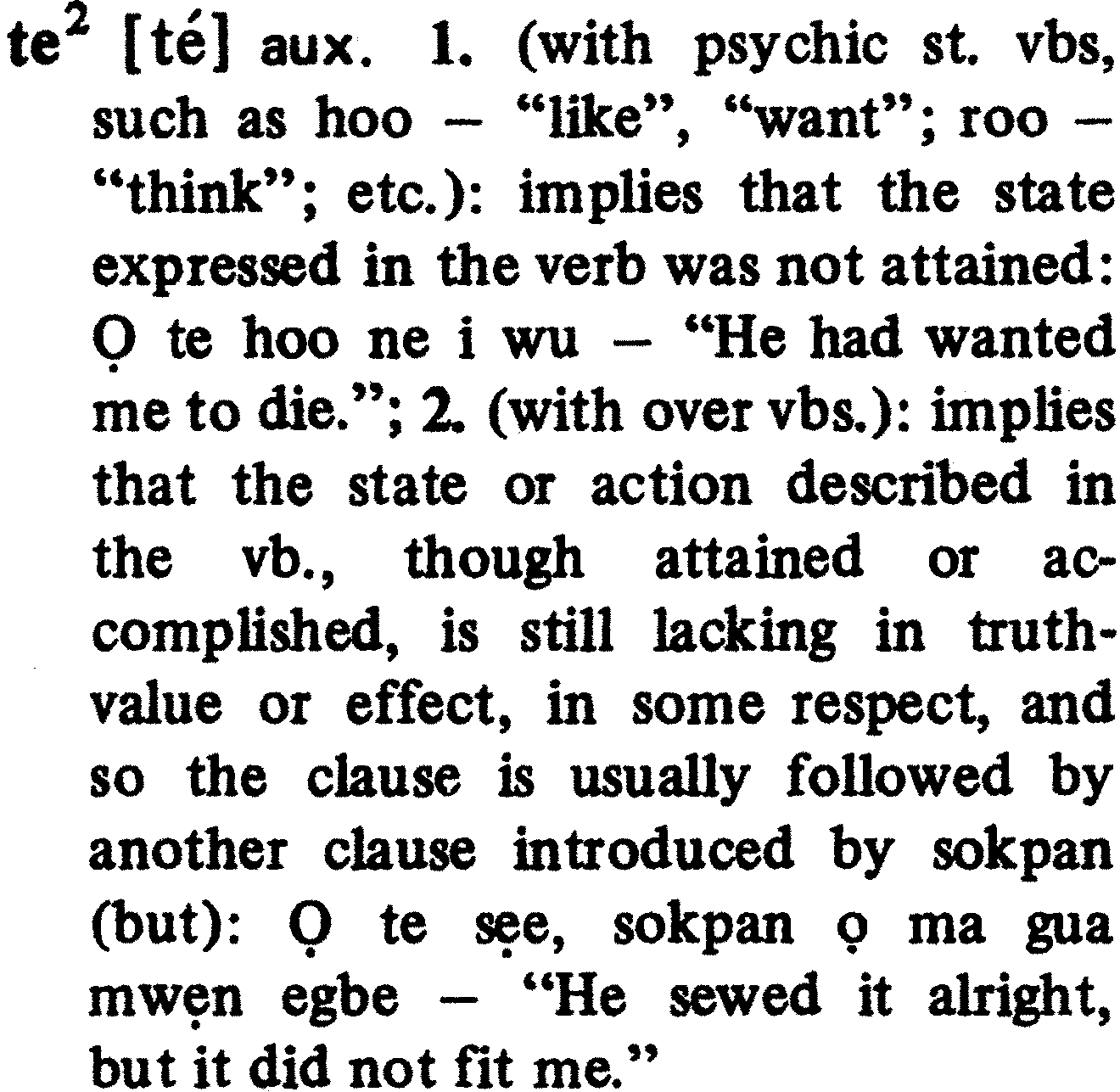
te3 [té] aux It occurs optionally at
sentence initial position to indicate
affirmation with a general meaning
that may be glossed as: “It is the
case that . . . ” Te ọ yẹ mwẹn ― “It
is the case that I like it” (i.e. I do
like it). When it occurs in a sentence
ending with the question particle
“ra”, te is usually the focus of the
%%
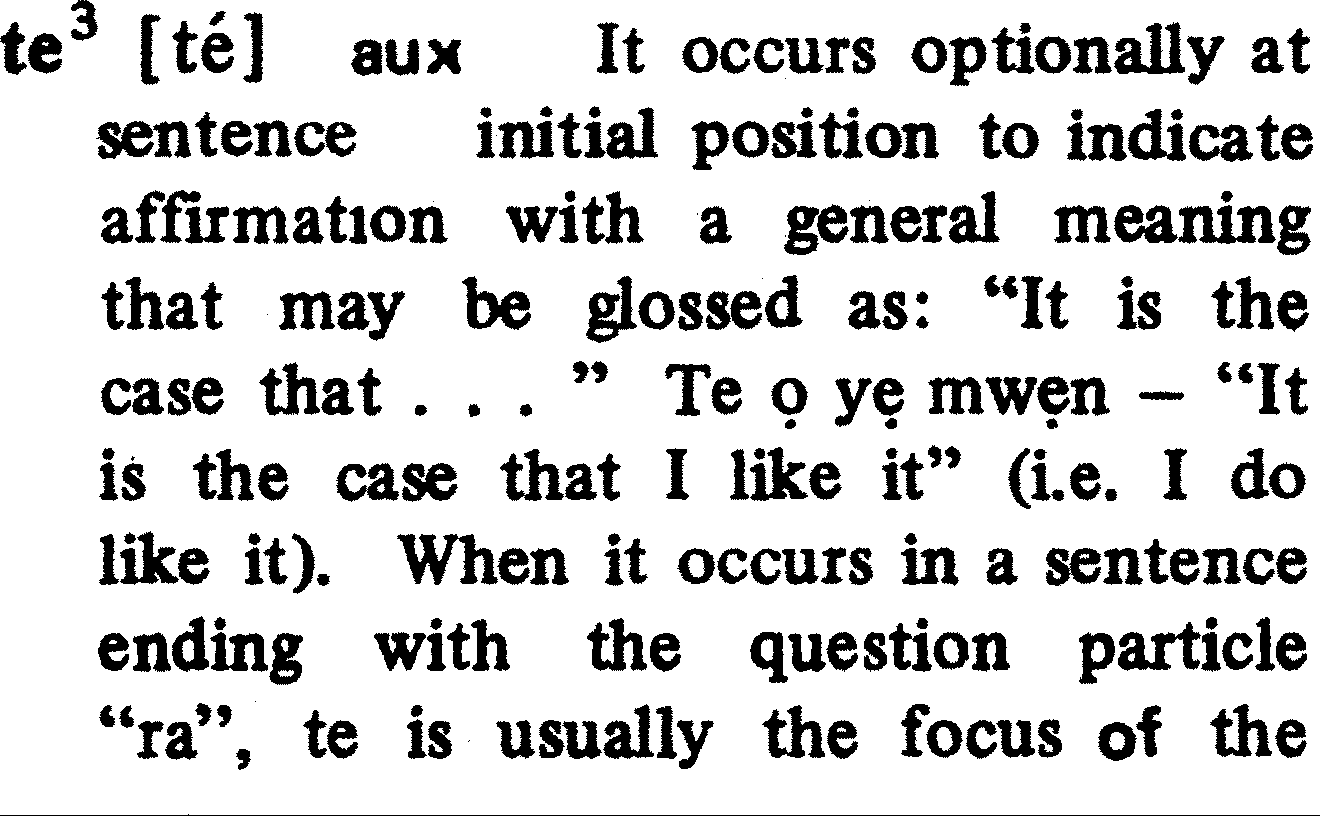
question: Te ọ yẹ ruẹ ra? “Is it the
case that you like it? (i.e. Do you
like it?)”^ If the answer to such a
question is affirmative, then “te”
introduces the sentence: Eẹn, te ọ
yẹ mwẹn ― “Yes,I like it.” If for
any reason it is deleted, the high
tone on its vowel replaces the low
tone of the pronoun: Ọ yẹ mwẹn ―
“It is the case that I like it.”
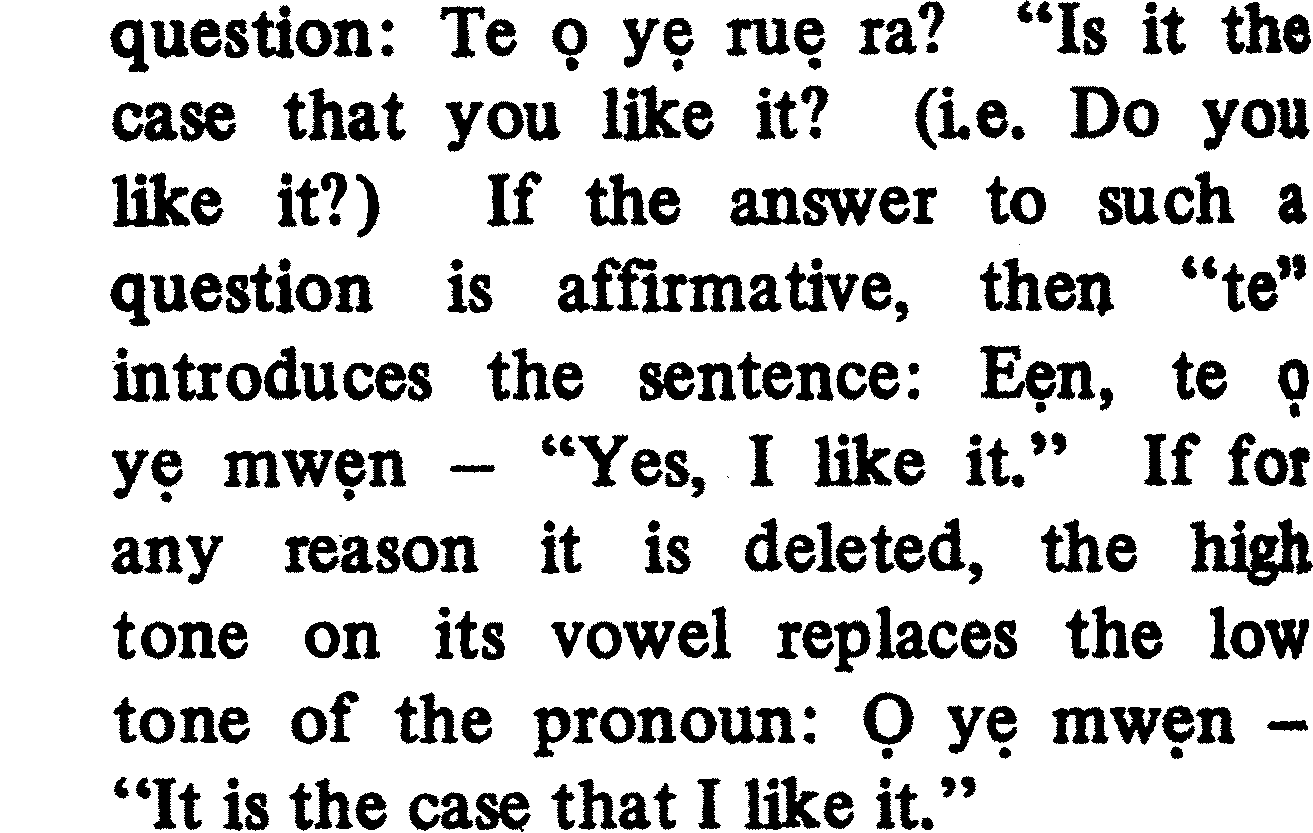
tee [tèé] vb. to decorate, to ornament:
Ọ ya efoto tee ughugha ẹre ― “He
decorated his room with pictures.”

teitei [téitéi] adv. describes the fast
beat of the pulses in a state of fear
or anxiety: Udu ẹre gha kpee teitei ―
“His heart is beating very fast.”

tengbemu [tẽ̀gbémũ̀] vb. (< tọn ―
egbe ― mu) “to lift body” to be
haughty; proud; arrogant.

tete [tèté] vb. to economize, to use
sparingly: Ọ ma rẹn vbe a tete ígho
hẹẹ ― “He does not know how to
spend money economically.”

tẹ1 [tɛ́] vb. to fall out of favour with;
to fall out of grace: Ọ tẹ nẹ vbe aro
mwẹn; ma vbe ọre i ghi ku ― “She
has fallen out of favour with me;
she and I are no longer close.”

tẹẹ [tɛ̀ɛ́] int. an address term, expres-
sive of speakers favourable disposition
toward the person addressed while
at the same time disfavouring a third
person: Lare, tẹẹ ― “Come (”good
person“, etc.)”
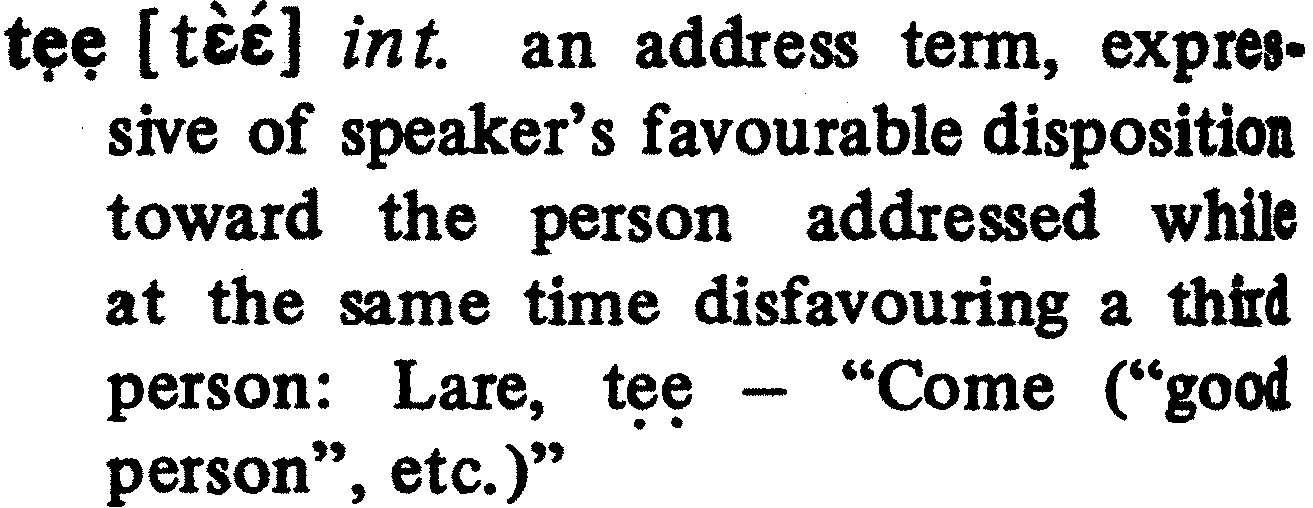
tẹẹn1 [tɛ̃̀ɛ̃́] vb. to be related to; to
have as a blood relative: Ma vbe ọre
tẹẹnrẹn vbe oberha ― “She and I
are related paternally.”

tẹẹn2 [tɛ̃̀ɛ̃́] vb. to file up; to display
in a file: Avbe oleghan tẹẹn dee ―
$Page 143$

“The prisoners are approaching in
a file.”

tẹntẹnẹntẹn [tɛ̃́tɛ̃́ɛ̃́tɛ̃́] adv. describes
the state of being crammed: Ughugha
nii vuọn tẹntẹnẹntẹn ne ẹvbo ― “The
room is crammed full of people.”

ti [tí] vb. to boil (e.g. water): Gie amẹ
ti nẹ u ke mu iyan yọ ― “Let the
water boil first before you add the
yam.” (also tin).

ti [tí] vb. to be plump: Okhuo na ti
vbe egbe hia ― “This woman is plump
all over.”

tian [tĩ̀ã́] vb. to praise: Ọ tian rẹn ye
iwinna ne ọ winnae ― “He praised
him for the work that he did.”

tiantian [tĩã̀tiã́] vb. same as niania.

tie [tìé] vb. 1. to call; to summon:
Tiẹ ẹre gun mwẹn ― “Call him for
me (also summon him to me)”.; 2.
to utter; to call out ― Iran tie eni
ẹnrẹn vbe odọ ― “They are calling
out his name over there.”; 3. to read
(also tiebe): Ọ tie ebe ne iran gbẹn
giẹe ― “He read the letter that they
wrote to him.”
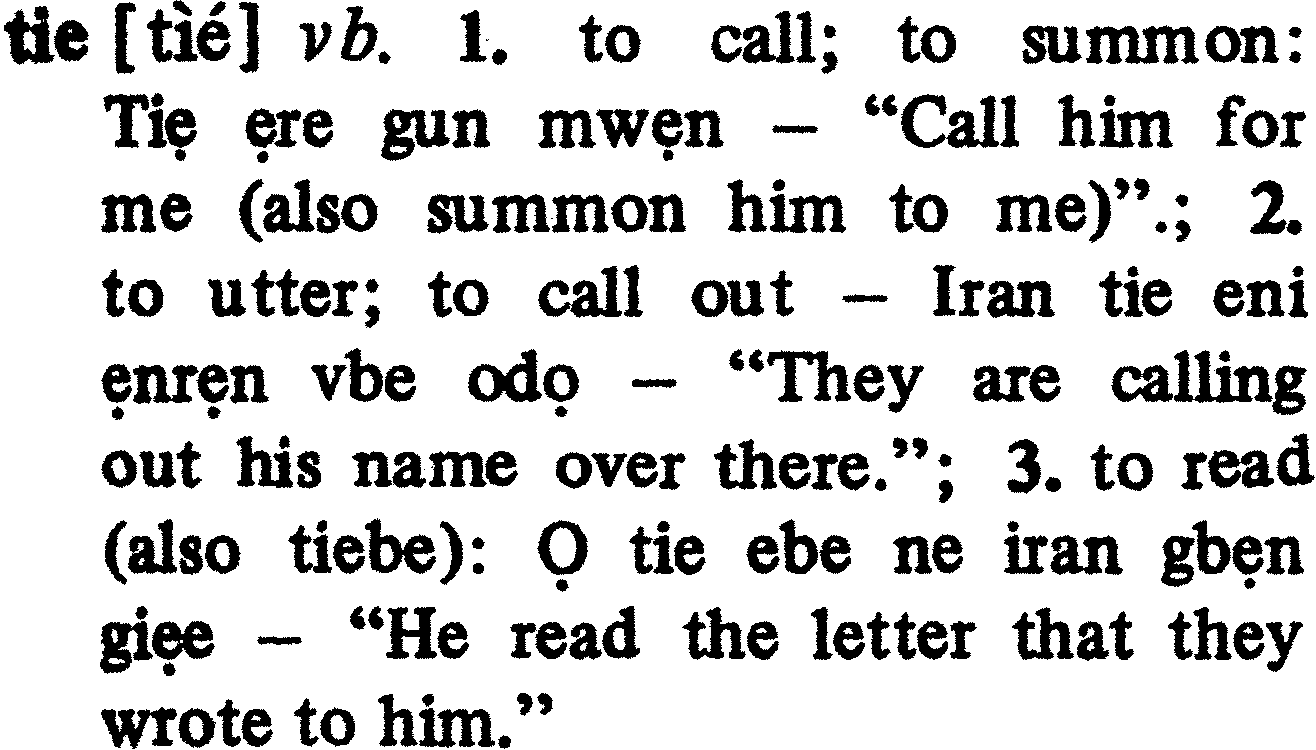
tiebe [tièbé] vb. (< tie ― ebe) “to
read book”: to read; to study ― Ọ
gua tiebe ― “He can read” (cf. tie).

tiẹbọ [tìɛ́bɔ́] vb. (< tie-ẹbọ) “to call
a deity”: to swear; to swear at (some-
body). Ọ tiẹbọ mẹ ― “He swore at
me.”

tiẹzọ [tìɛ́zɔ́] vb. (< tie-ẹzọ) to sue.

tighi [tìɣí] vb. cf. lighi.

tighitighi [tìɣìtìɣì] adv. in a tangled
state: Irri na ye tighitighi ― “This
rope is all tangled up.”
%%

tiihẹn [tìhɛ̃́] vb. to swear at; to curse
(a person).

tiii [tììì] adv. cf. kpiii.

tiko [tìkó] vb. (< tie ― iko) “to
summon a meeting”; to assemble;
to hold a meeting.

tila [tìlá] vb. to belittle; to despise:
Ọ ya aro tila oghian mwẹn rua ―
“He used eyes to belittle my enemy:
He belittled me with her look.”

tile [tílè] vb. to make a bet. (cf. ta).

tin1 [tĩ́] vb. to fly: Elikhukhu tin fua ―
“The pigeon has flown away.”

tin2 [tĩ́] vb. (with ihin) to sneeze (It
usually occurs as a single word with
ihiin when the two are not dis-
continuous in a sentence): Ọ tinhiin
kuọ nwẹn ― “He sneezed on me.”
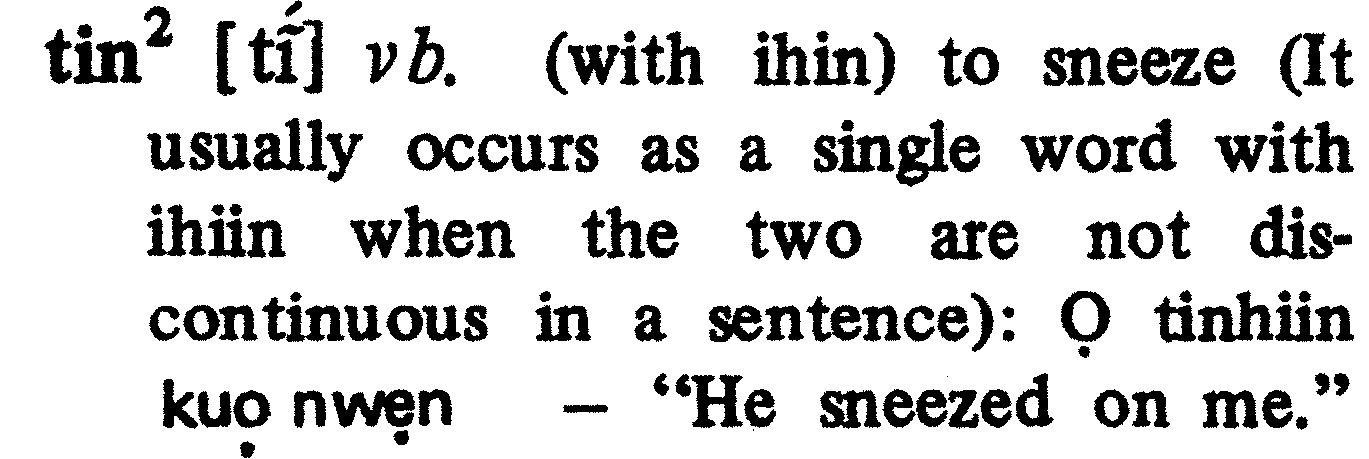
tin3 [tí] vb. to boil. (cf. ti).

tinniẹ [tynĩɛ̃́] vb. to be small; tiny:
Ọwẹ ọre tinniẹ ― “Her feet are small.”

tinniẹtinniẹ [tĩ́nyɛ̃́tĩ́nĩɛ̃́] adj.; adv.
(with pl. ref. only) very tiny; minute:
Iran ye tinniẹtinniẹ ― “They are
very tiny.”

tisẹ [tísɛ̀] vb. (< ta ― isẹ) “to play
isẹ”: to play isẹ ( a kind of game).

titi [tìtí] vb. 1. to be renowned; famous:
Ọba Ẹdo titi gbe ― “The ruler of
Benin is very famous.”; 2. to be
popular, to be in vogue: Igoru titi
gbe vbe obọ ikhuo ― “Gold is very
popular among women.”
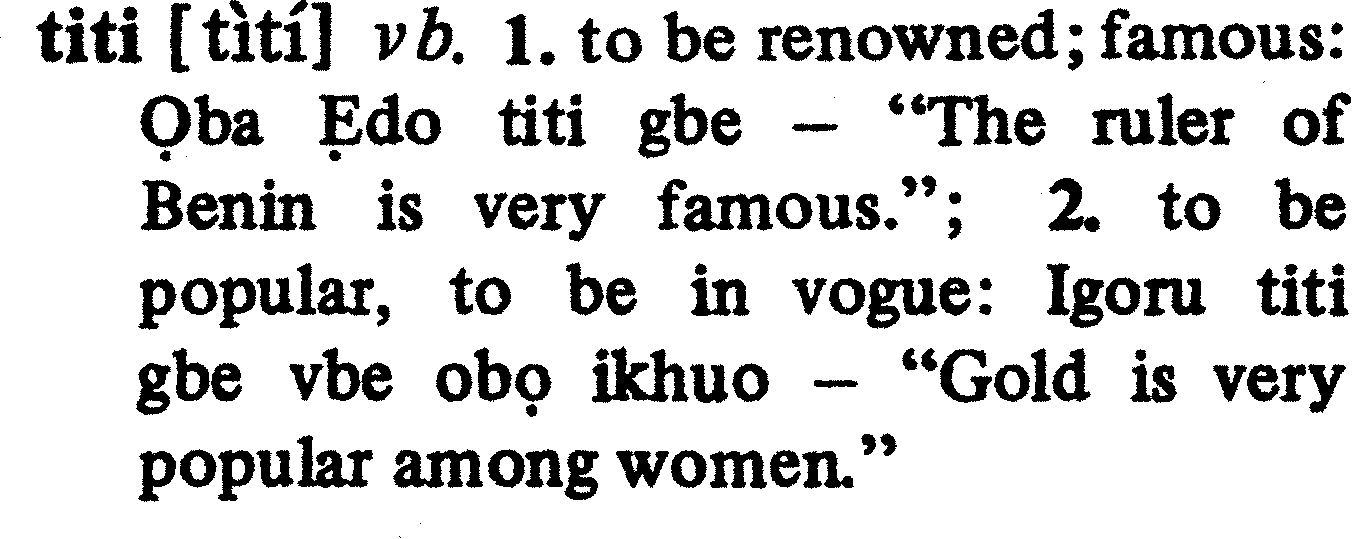
to [tó] vb. 1. to be peppery hot:
Uwọnmwẹn na waa to ― “This soup
is very peppery.”; 2. to be “effective”
(usually of a drug, a charm or a deity):
$Page 144$

Ukhunmwun na to gbe ― “This
medicine is very effective.”

toba [tòbá] vb. to stick to; to adhere
to ― Ebae toba mu ọkpan ― “Eba
has stuck to the plate.”

tobatoba [tòbàtóbá] n. cf. etobatoba.

tobọ-ọmwan [tòbɔ́ɱã̀] adv. by one-
self; the set of reflexive pronouns
are formed by replacing the second-
part of the compound: “ọmwan”
with the possessive form of the re-
spective pronoun forms: tobọ-mwẹn ―
“by myself.” tobọ-ruẹ ― “by your-
self”; tobọ-ọre ― “by himself/her-
self/itself”; etc.: Iran tobọ-iran kie
urho ― “They opened the door by
themselves.”
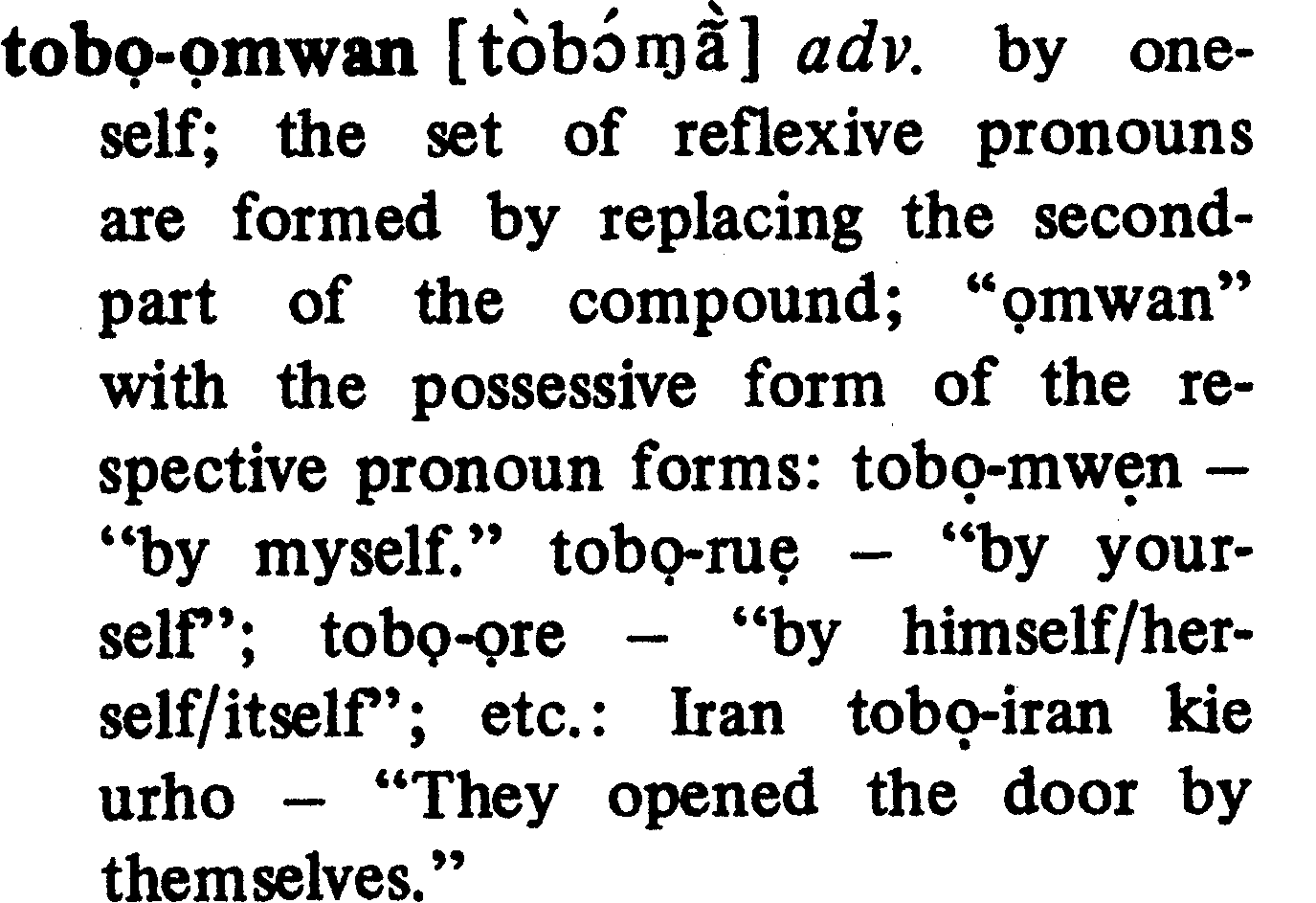
tohan [tòhã́] vb. to be compassionate
toward; to be kind to; to pity: Ọ
tohan Ozo rhie ígho nẹ ― “He com-
passionately gave Ozo some money.”

tohio [tòhió] int. Introductory formula
used by a story-teller to invite an
audience to listen to his story:
Story-teller: Tohio.
Audience: Hia hia kpoo.
Story-teller: I ra ta okha ọkpa ma
uwa ― (“I am going to tell you a
certain story”).
Audience: tae tao ighẹ ma dan-
mwẹnhọ ― (“Go on and tell it for
we are listening”). And then the
story begins.
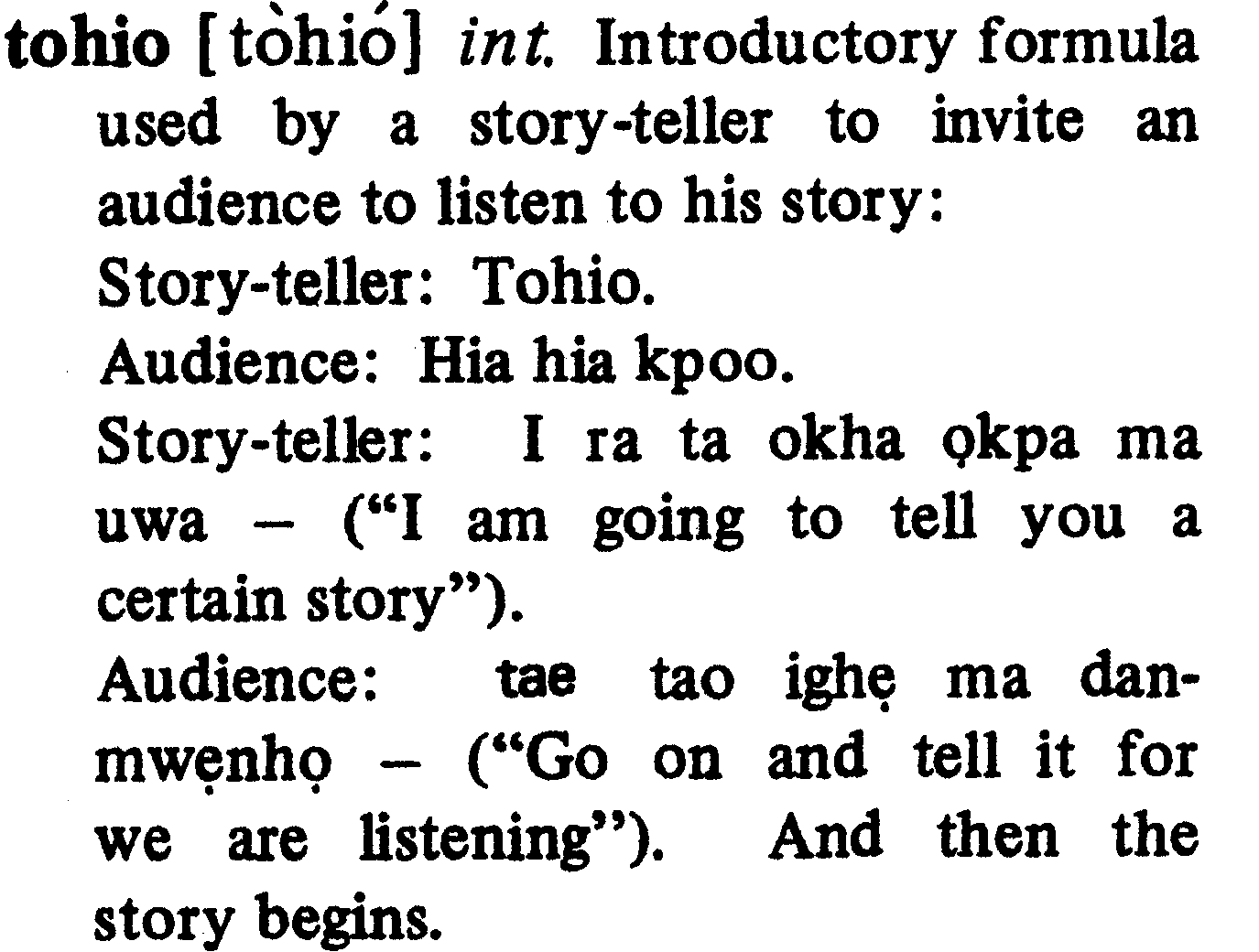
tohoghe [tòhóɣè] vb. (< ta ― ohoghe)
“to tell a lie”; to lie: Ọ tohoghe
gbe ― “He is fond of lying.”

tokha [tóxà] int. an exclamation in-
dicating surprise, and requesting for
confirmation of what had been said.
May be interpreted by expressions
such as “Really?”; “Is that so?”, etc.
%%
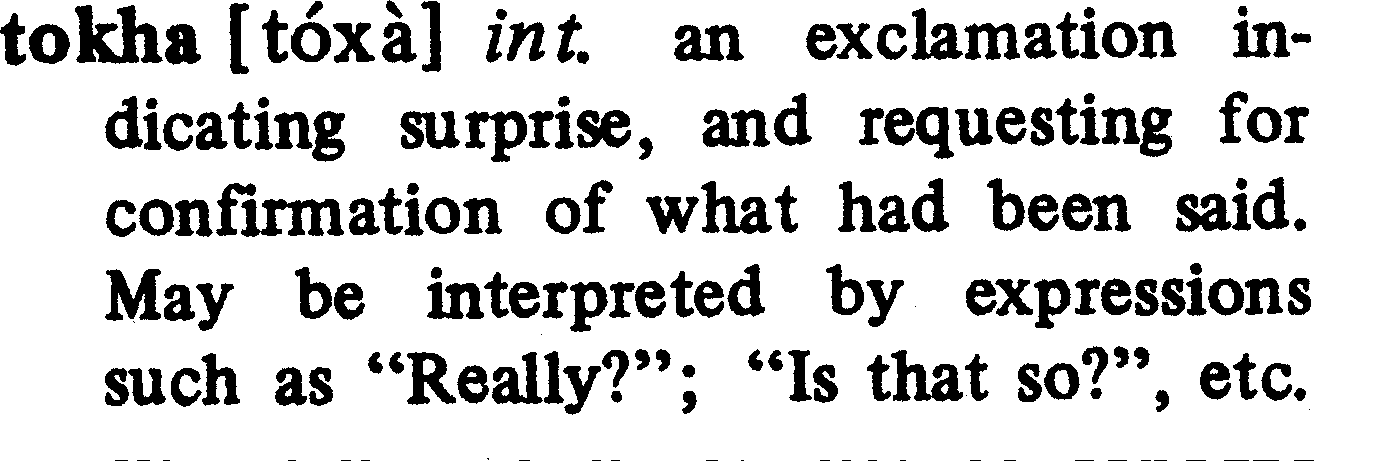
tota [tótàá] vb. to sit down; to sit.

toto [tòtó] vb. to revive; to fill out
(usually of an emaciated person).
Egbe ẹre fẹko toto dee nẹ ― “Her
body is gradually filling out again.”

tọ [tɔ́] vb. to live long: Emiamwẹn
i khian giẹe tọ ― “Sickness will not
let him live long.”

tọlọ1 [tɔ̀lɔ́] vb. 1. to itch: Egbe hia
tọlọ mwẹn ― “All my body is itching
me: I am itching all over.”; 2. to
scratch: Ọ tọlọ eke ne imuẹ na rriọe ―
“He scratched where the mosquito
bit him.”
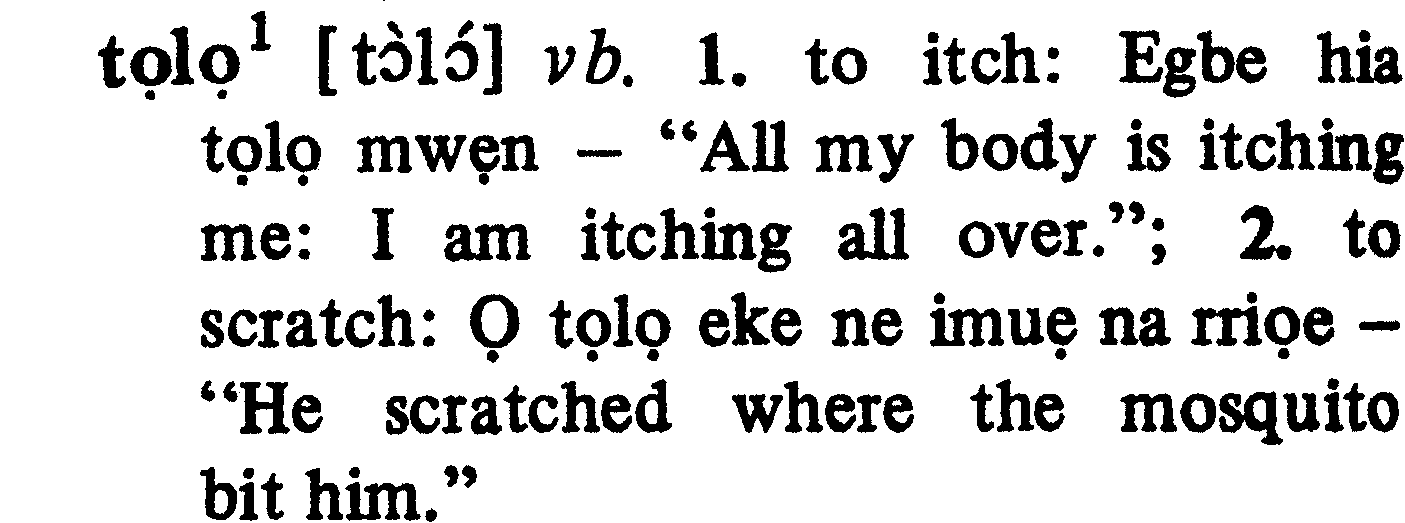
tọlọ2 [tɔ̀lɔ́] vb. (with ohuẹn) to suffer
from cough; to cough ― Ohuẹn tọlọ
mwẹn ― “Cough aftlicts me: I have
cough.”

tọn1 [tɔ̃́] vb. 1. to be hot (i.e. of high
temp.) Ya ukpọn muẹn ighẹ ọ tọn ―
“Carry it with a piece of cloth for
it is hot.”

tọn2 [tɔ̃́] vb. to roast (over open fire):
Ọ tọn ọghẹdẹ ne ima re ― “She roasted
plantain for us to eat.”

tọn3 [tɔ̃́] vb. to fell (a tree); to cut
down (usually a tree): Ọ ma tọn
erhan ne i rre evba ọ kẹ gha kọ emwin
yọ ― “He did not fell the trees there
before he started to grow things in
it.”
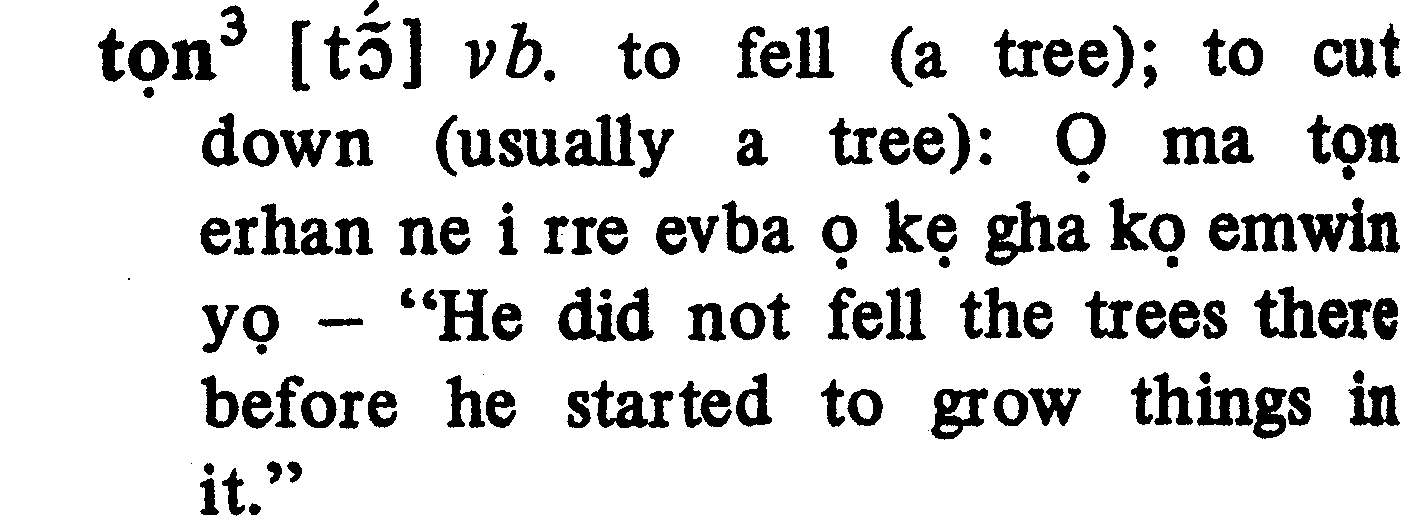
tọn4 [tɔ̃́] vb. to bury (something) in
the ground: Ọ tọn ígho ẹre hia ye
uwotọ ― “He buried all his money
in the ground.”

tọn5 [tɔ̃́] vb. (with mu) to lift; to
carry: Ọ tọn ihẹ mu yan uhunmwun
aga ― “He lifted the load onto the
top of the chair.”
$Page 145$

tọnnọ [tɔ̃̀nɔ̃́] vb. 1. pl. or iter. sense
of tọn2; tọn3; tọn4 and tọn5: Iran
tọnnọ iyan re ― “They roasted yam
and ate”; Iran tọnnọ erhan nii hia
kua ― “They fell all those trees”;
Iran tọnnọ ígho iran hia ye uwotọ
― “They buried all their money in
the ground”; Iran tọnnọ ihẹ mu
yan uhunmwun ― “They lifted the
loads onto their heads.”
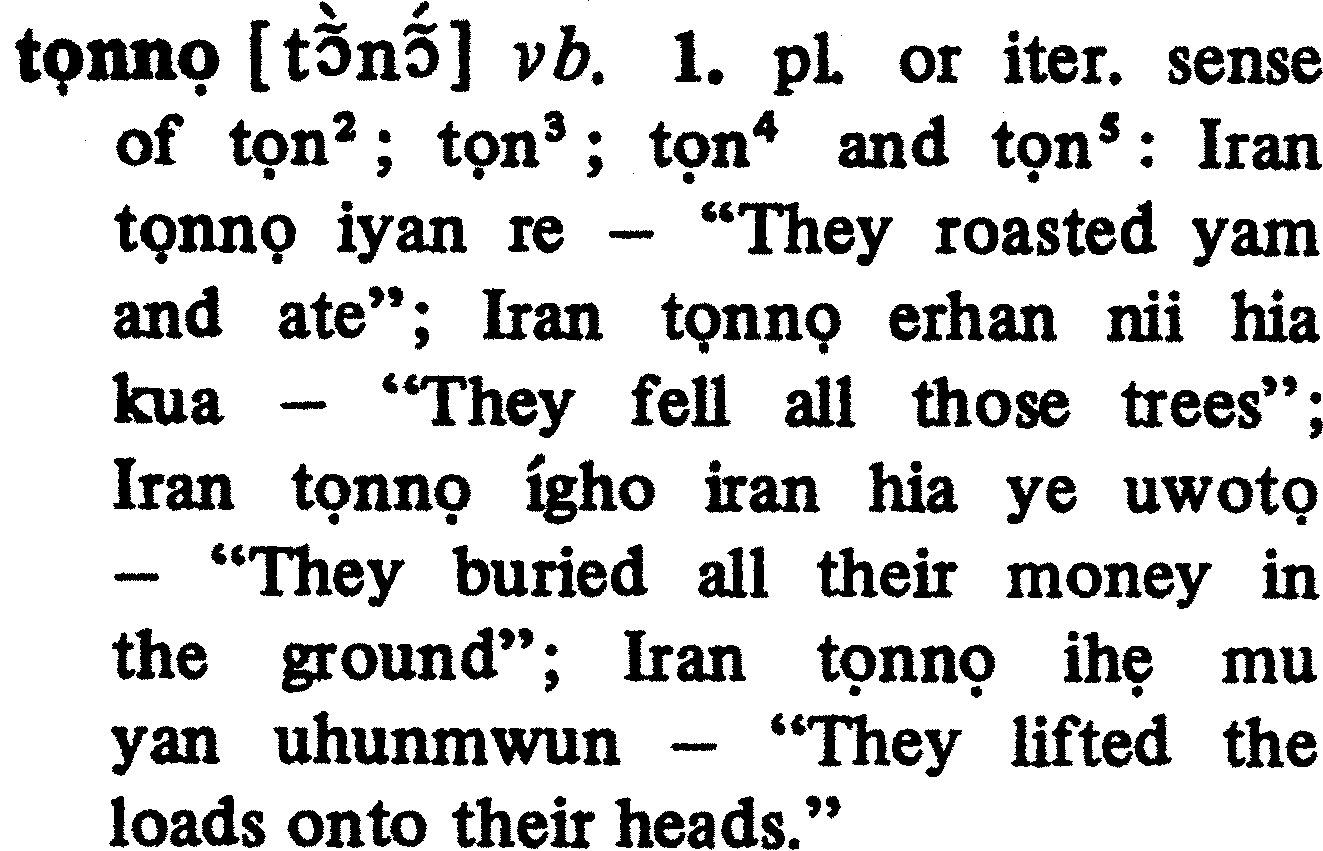
tọntọn [tɔ̃̀tɔ̃́] vb. cf. toto.

tu1 [tú] vb. 1. to cry: Ọ kpẹre ne
ọvbokhan na ke tu sin ― “It is a
long time since this child has been
crying.”; 2. to shout: Iran tu ne
oghọghọ vbe iran mioẹn ― “They
shouted for joy when they saw him.”
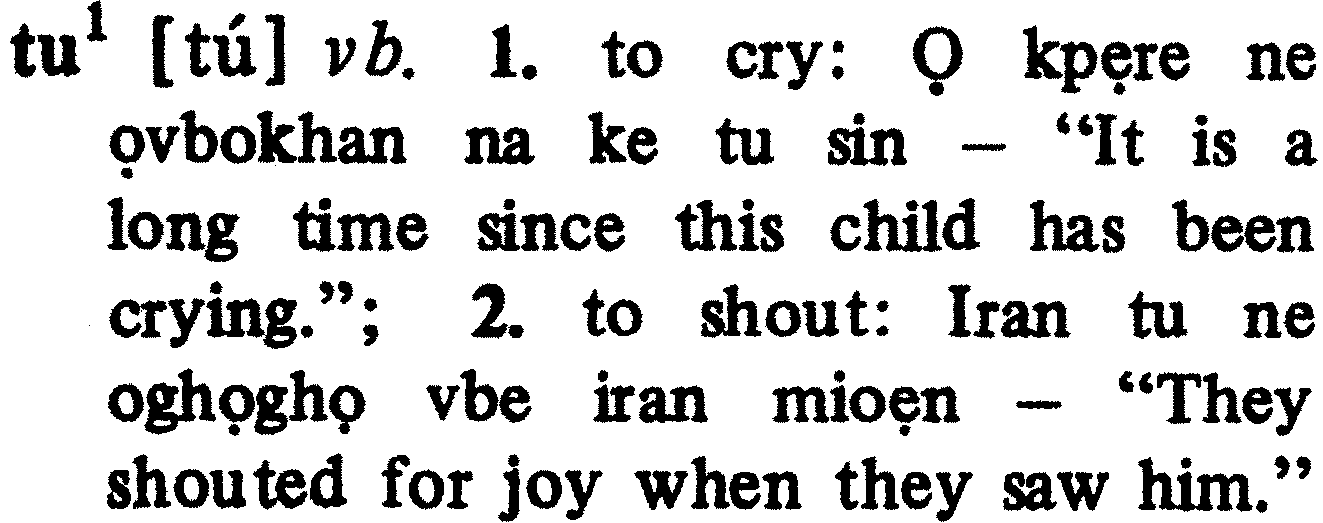
tu2 [tú] vb. (of ẹgogo) to strike: Inu
ẹgogo ọ he tu yi? “How many clocks
have struck? i.e. what time is it?”

tu3 [tú] vb. (with asẹn) to emit (spit).

tua [tùá] vb. 1. to tighten; to make
firm: Tua irri ne u ya gba iran ne
iran ghẹ kharha kua ― “Tighten
the rope with which you tied them
so that they may not drop out.”;
2. to intensify (e.g. effort) Wa tua
yọ ne a rherhe ruẹe foo ― “Intensify
your effort so that we may complete
it in good time.” (also tuabọ); 3.
to be overly-demanding; to impose
excessive pressure: Iwinna rẹn tua
gbe ― “His work is too demanding.”
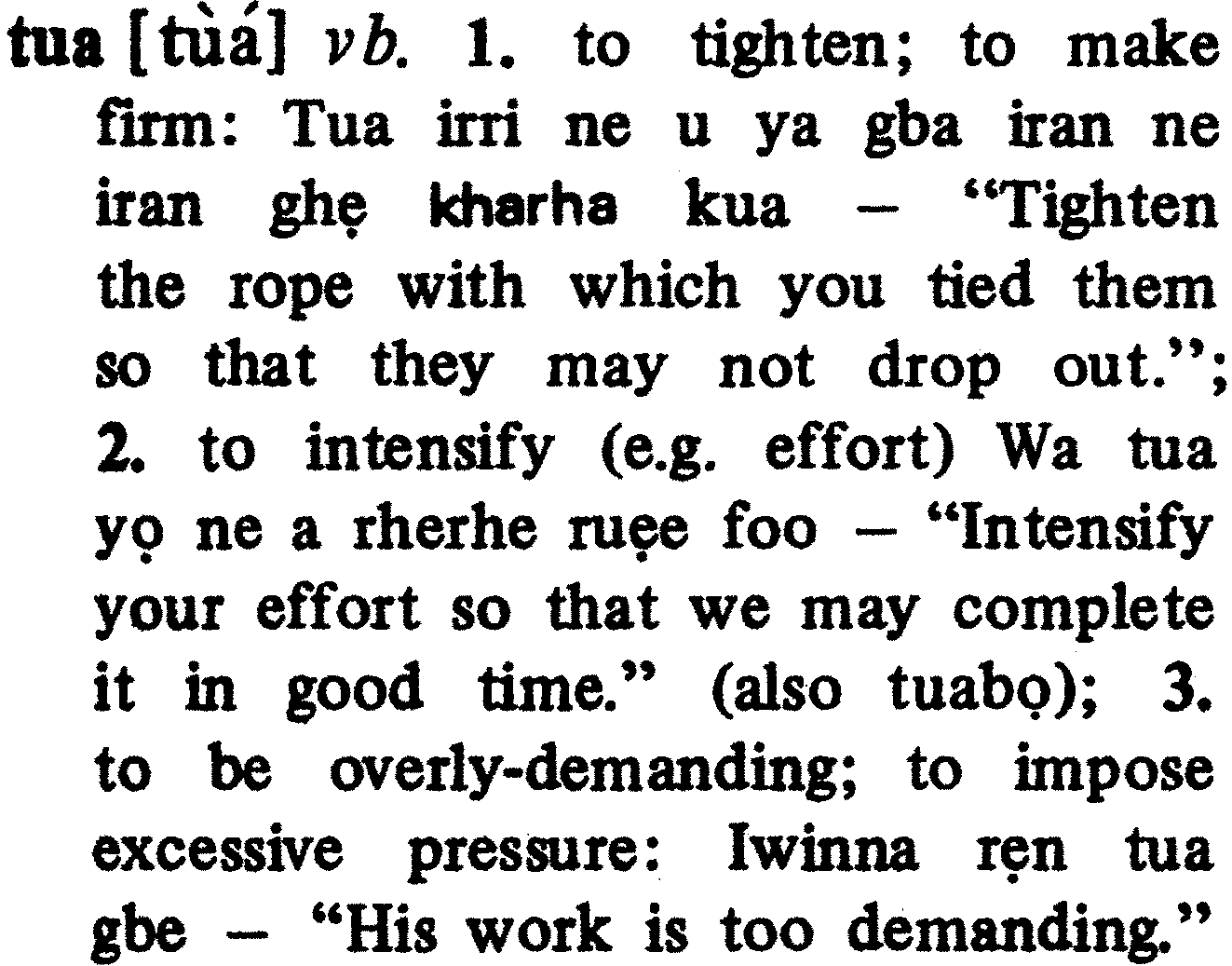
tuabọ [twàbɔ] vb. (< tua ― obọ) “to
tighten hand”: to intensify effort
(in doing something). (also zabọ).

tuakpẹ [twàkpɛ́] vb. (< tua ― ukpe)
“to intensify lip”: to shout; to talk
loudly. Ọ tuakpẹ gbe ― “He shouts
too much.”

tuasẹn [tuásɛ̃̀] vb. (< tu3 ― asẹn)
%%

“to emit spit”: to spit.

tuantuantuan [tũ̀ã́tũ̀ã́tũ̀ã́] adv. de-
scribes blinking fast: Ọ gha bunnọ
aro tuantuantuan ― “He is blinking
fast.”

tuantuantuan [tw̃ã̀tw̃ã̀tw̃ã̀] adv. de-
scribes a constant gaze: Ọ gha ghe
mwẹn tuantuantuan ― “She is gazing
at me continuously.”

tue1 [tùé] vb. 1. to pour out (from
a container): Ọ tue ayọn ye ukpu ―
“He poured wine into a cup (from
a bottle)”; 2. to spill: amẹ tue kue
otọ ― “Water spilled onto the ground”;
3. to leak out; to ooze: Owẹ ne ọgọ
fian mwẹn re ye tue esagiẹn ― “My
foot which was cut by a piece of
bottle is still oozing blood.”
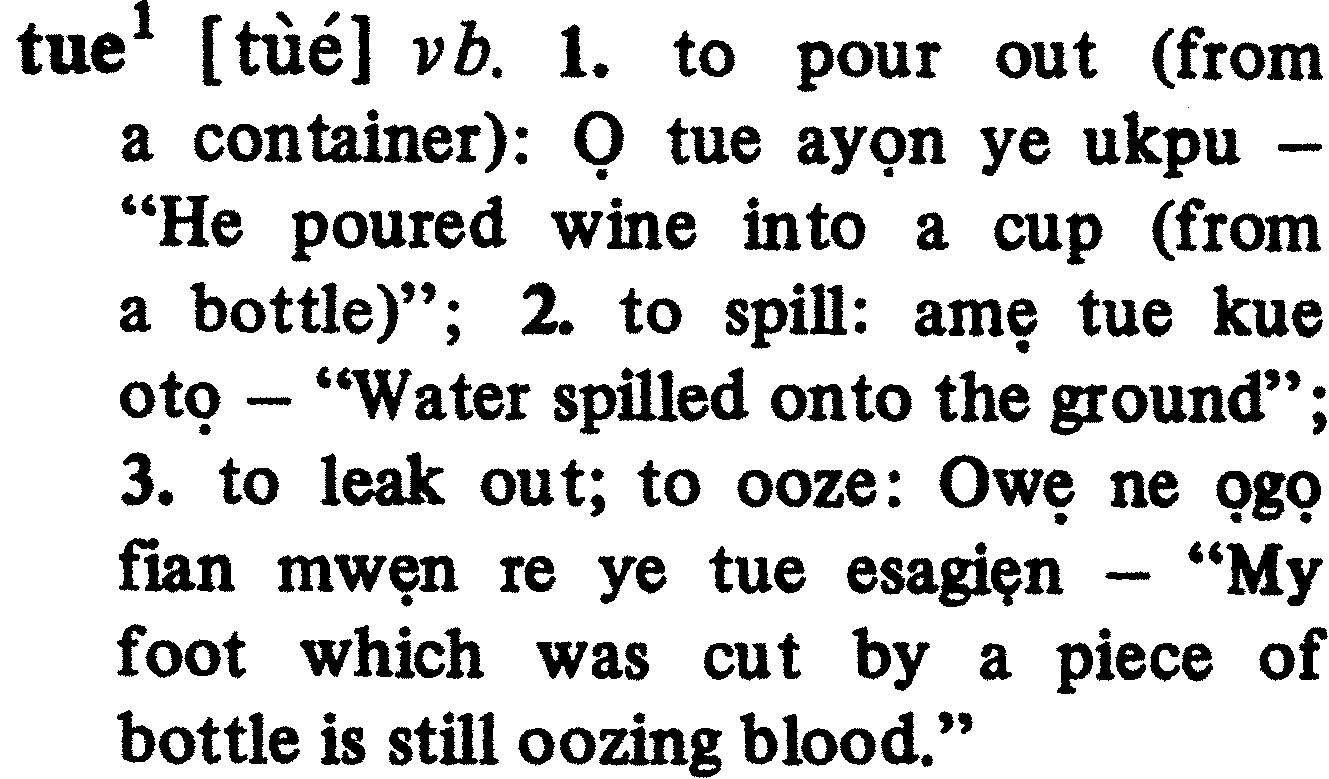
tue2 [tùé] vb. (of eto) to comb or
brush out and leave unstyled or
unplaited: “Okhuo na tue eto ye
uhunmwun gha rrie ore”^ ― “This
woman brushed out her hair and
went out like that i.e. She went
out with her hair brushed out unstyled
and unplaited.”
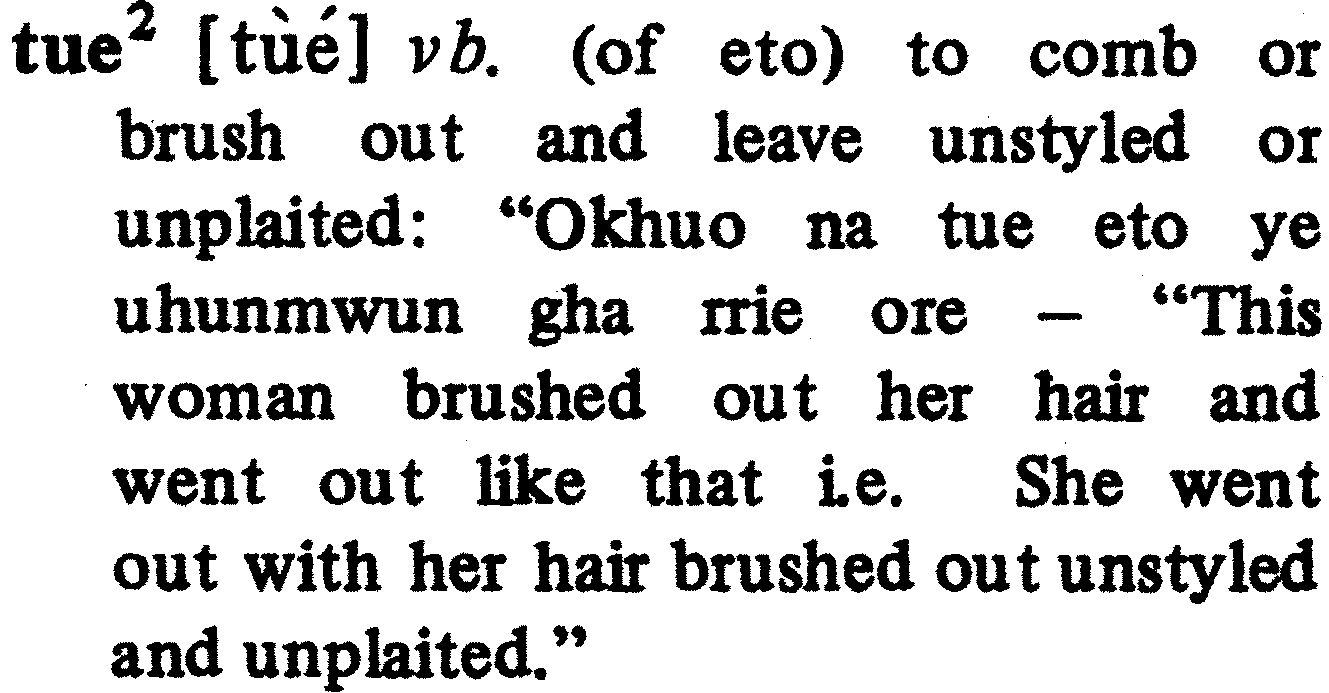
tuẹ [twɛ́] vb. 1. to greet; to salute.
Ọ ma tuẹ ọmwan rhọkpa vbe ọ laọ
owa ― “He did not greet anybody
when he came into the house.”; 2.
to pay a visit (to a person): Ọ ya
tuẹ ọse ọre ne ọ da biẹ ― “She went
to visit her friend who had just had a
baby.”
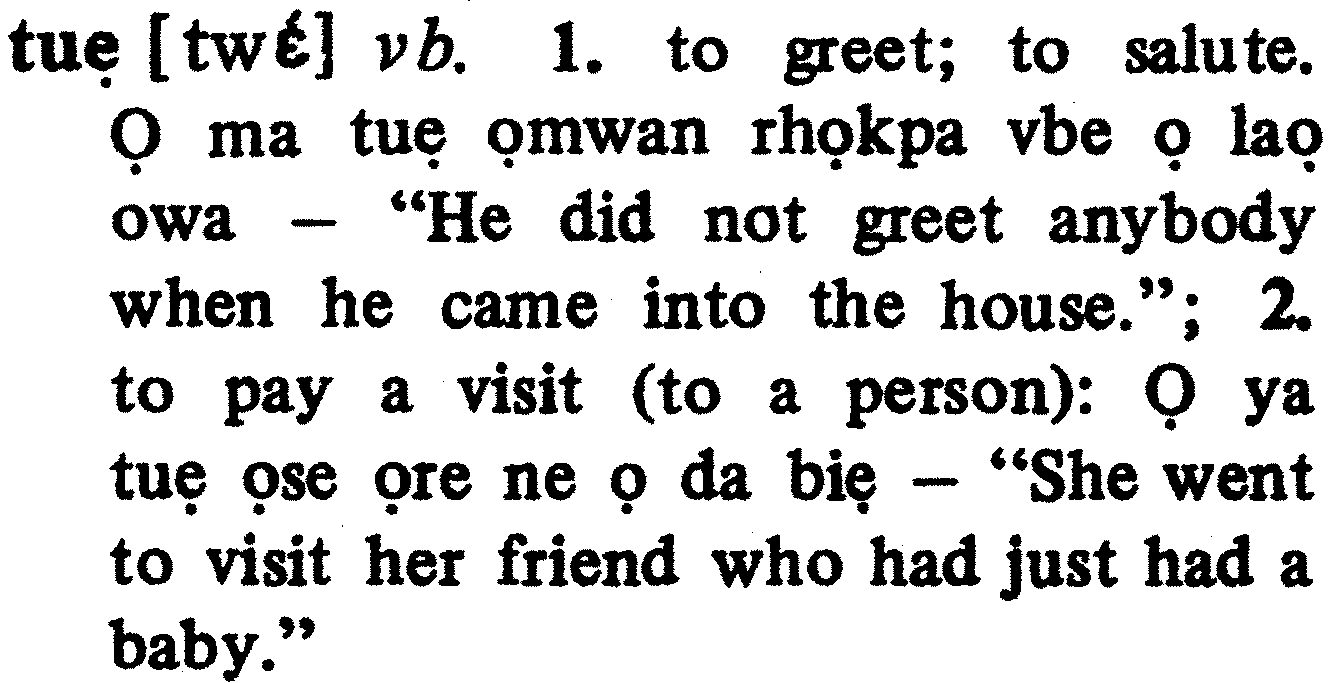
tuẹin [tw̃ɛ́ĩ́] adv.; adj. describes some-
thing very small (also tueintuein for
pl. or iter. ref.) Ehia ye tuẹintuẹin ―
“They are all very tiny.”

tuẹintuẹin [tw̃ɛ̃́ĩtw̃ɛ̃́ĩ] vb. cf. tuẹin.

tuẹyi [twɛ̀yí] vb. to announce the
presence of a person; to seek audience
$Page 146$

for a person: Ọ kpẹre nẹ i ghi rre
sin; i ma miẹ enọ tuẹyi mwẹn ―
“It is a long time since I arrived; I
did not find anybody to announce
my presence.”

tughu [tùɣú] vb. cf. lughu.

tukẹ [tùkɛ́] vb. to be small, tiny. Iyan
na tukẹ gbe ― “These yams are too
small.”

tukẹtukẹ [túkɛ́túkɛ́] adv.; adj. de-
scribes very tiny things or a manner
%%

of doing things in small bits: Ọ manọ
iran tukẹtukẹ ― “He moulded them
in little bits.”

tulẹ [tùlɛ́] vb. 1. to run (same as
rhulẹ); 2. tulẹmu: to pick up a race;
to take off; to start running.

tuo [twó] vb. 1. to hang low: Ọbọtuo
na tuo ― “These eaves are low-hanging”^;
2. (of a garment) to droop low; to
be long: Gi abọ ẹwu na tuo ― “Let
the edge of this cloth droop low.”
